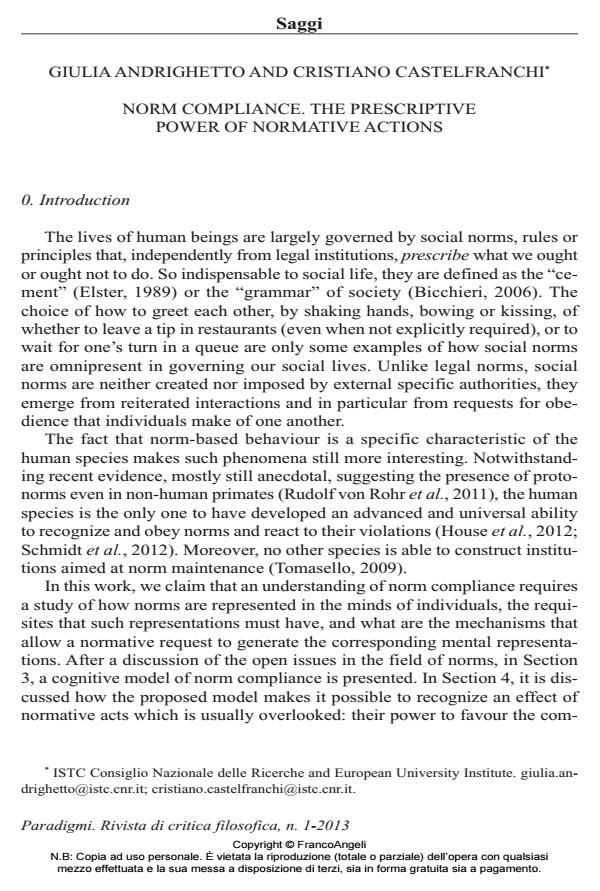Norm Compliance. The Prescriptive Power of Normative Actions
Journal title PARADIGMI
Author/s Giulia Andrighetto, Cristiano Castelfranchi
Publishing Year 2013 Issue 2013/2
Language Italian Pages 12 P. 139-150 File size 106 KB
DOI 10.3280/PARA2013-002011
DOI is like a bar code for intellectual property: to have more infomation
click here
Below, you can see the article first page
If you want to buy this article in PDF format, you can do it, following the instructions to buy download credits

FrancoAngeli is member of Publishers International Linking Association, Inc (PILA), a not-for-profit association which run the CrossRef service enabling links to and from online scholarly content.
In this paper, we propose a cognitive analysis to shed light on the link between social norms and normative acts. Understanding the link between social norms and action requires a study of how norms are represented in the mind of individuals and of the mechanisms allowing the generation of these mental representations. The proposed analysis allows us also to highlight an interesting consequence of normative acts, which is usually overlooked: their power to favour the communication and subsequent diffusion of norms.
Keywords: Behavioural communication, cognitive modelling, expectations, normative influencing, norms, punishment.
- Can Lawlike Rules Emerge without the Intervention of Legislators? Klaus G. Troitzsch, in Frontiers in Sociology 2/2018
DOI: 10.3389/fsoc.2018.00002 - The Cambridge Handbook of Moral Psychology Giulia Andrighetto, Eva Vriens, pp.78 (ISBN:9781108894357)
- Indignation and conflict-associated behavior – does cognition matter? Julia A. Schreiber, Mathias Jaudas, Jürgen Maes, in International Journal of Conflict Management /2025 pp.586
DOI: 10.1108/IJCMA-05-2024-0118 - Advances in Social Simulation 2015 Klaus G. Troitzsch, pp.413 (ISBN:978-3-319-47252-2)
- The Cambridge Handbook of Moral Psychology pp.31 (ISBN:9781108894357)
Giulia Andrighetto, Cristiano Castelfranchi, Norm Compliance. The Prescriptive Power of Normative Actions in "PARADIGMI" 2/2013, pp 139-150, DOI: 10.3280/PARA2013-002011